|
|
|
Sort Order |
|
|
|
Items / Page
|
|
|
|
|
|
|
| Srl | Item |
| 1 |
ID:
103196
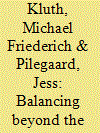

|
|
|
|
|
| Publication |
2011.
|
| Summary/Abstract |
The present paper seeks to make sense of recent European Union (EU) naval capability changes by applying neo-realist theory to the EU as a collective actor in the global balance of power. The paper compares two different strands of neo-realist theory by deducing key predictions about the expected naval posture of the Union and the corresponding expected changes in capabilities. These predictions are subsequently held up against post-cold war data on naval acquisitions in the EU. The paper concludes that the observed patterns are best explained not as bandwagoning with the USA, but as a long-term balancing strategy aimed at bolstering the autonomy and international influence of the Union vis-a-vis other major powers, including the USA.
|
|
|
|
|
|
|
|
|
|
|
|
|
|
|
|
| 2 |
ID:
103194
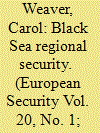

|
|
|
|
|
| Publication |
2011.
|
| Summary/Abstract |
Three theories that can be usefully employed to analyse the security of the Black Sea region are structural realism, security communities and supranationality (based on the European Union (EU) model). Given that the Black Sea area currently has too many conflicts and rivalries to be a truly cooperative region or a 'security community', we must examine its dynamics in terms of its present realism, especially in the east of the region ('what is'), as well as considering its future ('what could be'). Regionalisation and Europeanisation are both possibilities for the longer term but, for the development of a fully cooperative region, possibly based on the EU model, it is posited that a condition of 'balanced multipolarity' must initially exist. The paper analyses the extent to which this type of polarity applies at the moment and then uses all the theories to outline possible ways forward for the region.
|
|
|
|
|
|
|
|
|
|
|
|
|
|
|
|
| 3 |
ID:
103195
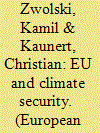

|
|
|
|
|
| Publication |
2011.
|
| Summary/Abstract |
This article analyses the development of the European Union (EU) as a global actor in the area of climate security. Building on this, it explicitly draws on constructivist concepts such as norm entrepreneurship and epistemic communities. To this end, it adopts the framework of epistemic communities, as developed by Peter Haas, in order to suggest that there is a group of EU officials, EU member states and think-tank activists, who drive the climate security agenda of the EU. Thus, it examines the precise actors involved in this EU epistemic community for climate security. This group promotes a reason for action at the global level, resulting in the attempt to diffuse this norm: climate change has consequences for international security; thus, it requires the development of appropriate policies and capabilities within the EU and globally. This article suggests that the epistemic community on climate security has been effective at diffusing this norm at both levels, albeit with differences.
|
|
|
|
|
|
|
|
|
|
|
|
|
|
|
|
| 4 |
ID:
103198
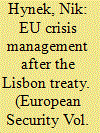

|
|
|
|
|
| Publication |
2011.
|
| Summary/Abstract |
The presented article focuses on key issues and developments in the European Union (EU)'s comprehensive crisis management planning, civil-military coordination and cooperation, as well as the future of the EU Operational Headquarters (OHQ). The article begins with a short overview of key changes in the EU's external action after the Lisbon Treaty, and focuses on the area of Common Foreign and Security Policy (CFSP) and Common Security and Defence Policy (CSDP). The impact of the European External Action Service on CSDP-CFSP cooperation in planning and on EU's crisis management is being examined. Further on, the article continues by addressing the issue area of EU crisis management. After the evolution of the concept and practice at the EU level is examined and different phases are discussed, the article analyses the main political, strategic and operational trends in this field. Indeed, this part reflects on the implications of the Lisbon Treaty for crisis management. What follows is an assessment of the civil-military coordination in the EU's crisis management structures. In order to contextualise the most recent transformations that are investigated at length, basic concepts and terms are outlined, and the evolution of civil-military coordination at the EU level is presented. The final substantive part tackles current and future EU OHQ options. After the necessary contextualisation, the characteristics and shortcomings of the three current options are analysed, and based on these limits, the case for the establishment of a permanent strategic planning and conduct structure in Brussels is put forward. Finally, concluding remarks and recommendations are attached.
|
|
|
|
|
|
|
|
|
|
|
|
|
|
|
|
| 5 |
ID:
103201


|
|
|
|
|
| Publication |
2011.
|
| Summary/Abstract |
The article dicusses the conditions, obstacles and prospects for a modernisation partnership with Russia as a way to improve European security and relations between Russia and the West in general, including Russia's NATO membership.
|
|
|
|
|
|
|
|
|
|
|
|
|
|
|
|
| 6 |
ID:
103202
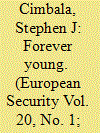

|
|
|
|
|
| Publication |
2011.
|
| Summary/Abstract |
The New Strategic arms reduction treaty nuclear arms control agreement signed by US President, Barack Obama, and Russian President, Dmitry Medvedev, in 2010 is likely to achieve ratification in both Washington and Moscow, but it is too early to break out the champagne or vodka. Even successful ratification of this agreement is, at best, an important but incremental part of the US-Russian policy 'reset' and the larger agenda for both states with respect to arms reduction and nonproliferation. Further reductions in both states' inventories of strategic nuclear weapons are a necessary preface toward credible leadership in stopping the spread of nuclear arms - especially in the looming test cases of Iran and North Korea. In addition, both states have to decipher a policy-strategy nexus for emerging missile defense technologies: in particular, whether missile defenses should be seen as possible means of cooperative security, as between NATO and Russia, or whether they are firewalls in the way of further progress in offensive nuclear arms reductions.
|
|
|
|
|
|
|
|
|
|
|
|
|
|
|
|
| 7 |
ID:
103197


|
|
|
|
|
| Publication |
2011.
|
| Summary/Abstract |
British politicians often argued that Britain maintained its navy only in order to secure its own survival by keeping sea communications open, while Germany in no real need of a powerful navy, threatened this legitimate British policy-goal by pursuing expansionist politics. German leaders, emboldened and a little dazzled by the tremendous industrial and economic success of the newly unified Reich, held that Britain was maintaining its economic dominance in the Empire by military means and thus blocking the progress Germany hoped to make in its aspiration to parity status and economic prosperity, with all that that entailed. This paper will explore the underlying rationale of the arms race between Britain and Germany shining through in those different positions on legitimate (military) policy aims. It will go beyond the visible symbols, as it were, of the Dreadnought and the Two-Power standard. These very concrete matters will also be dealt with here but, more importantly, this essay is meant to give some answer as to whether an archetypal differentiation between survival on the one hand and domination on the other can be made out as the predominant logic that led the two countries to embark on the road to the Great War.
|
|
|
|
|
|
|
|
|
|
|
|
|
|
|
|
| 8 |
ID:
103200


|
|
|
|
|
| Publication |
2011.
|
| Summary/Abstract |
This article discusses Russian perceptions of and attitudes toward the North Atlantic Treaty Organization (NATO). Russia has historically disliked and mistrusted NATO, seeing it as the primary threat to its international aspirations; in practice Russia pursues a dual policy. Its harsh condemnation of NATO has not stopped it from cooperating in selected areas of mutual interest. The most important among them is support for NATO's military operations in Afghanistan. The recent rejuvenation of relations between the west and Moscow is known as the strategic 'reset', meaning a return to diplomatic contacts and limited cooperation regardless of disagreements over the invasion of Georgia and Moscow's other recent international transgressions. The reset in NATO-Russia relations has only tactical significance, however. Cooperation will take place on a limited basis, but a genuine reset in mutual relations must wait for a reset in Russia's political and strategic priorities.
|
|
|
|
|
|
|
|
|
|
|
|
|
|
|
|
| 9 |
ID:
103199
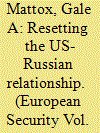

|
|
|
|
|
| Publication |
2011.
|
| Summary/Abstract |
The determination of the USA to 'reset its relationship' with Russia has been a major security policy objective for the current US Administration. An admirable objective, it has proved more illusive than anticipated. But a focus on 'cooperative engagement'1 that selectively addresses areas of common interests such as Iranian nuclear developments, a range of issues dealing with nuclear arms control, missile defense, and NATO-Russian relations (among others) could prove fruitful for both lessening tensions and establishing common agendas to resolve contentious issues. Important to that process will be enhancing institutions in order to assure longer-term productive relations that engage and vest both the USA and Russia. This more realistic approach of 'cooperative engagement' within existing, but strengthened organizations would both 'reset' the relationship and encourage relations that reach beyond cold war military thinking to sustained future cooperation.
|
|
|
|
|
|
|
|
|
|
|
|
|
|
|
|
|
|
|
|
|